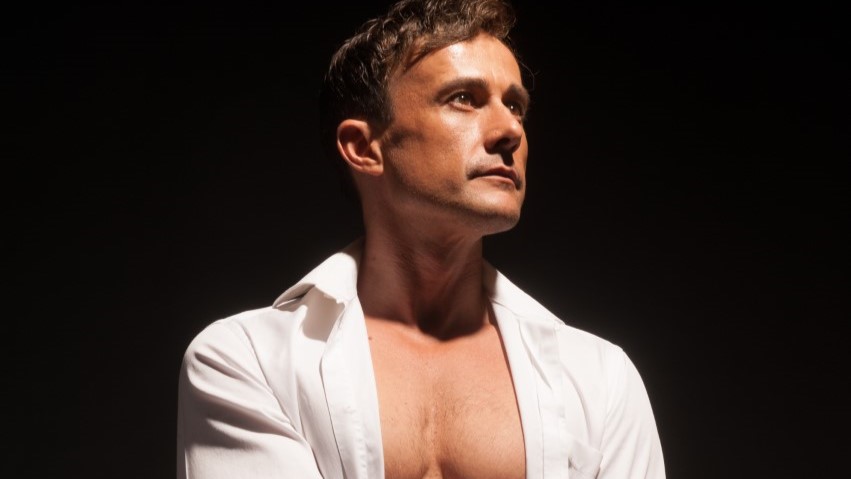SALT LAKE CITY — Confessions of a Mormon Boy first premiered at the Rose Wagner Performing Arts Center over 20 years ago with subsequent performances across the globe. Written and performed by Steven Fales, Confessions of a Mormon Boy has since evolved to Mormon Boy Trilogy: Confessions of a Mormon Boy, Missionary Position, and Prodigal Dad, and Fales is performing all three parts in Salt Lake City at the same theatre where it all began. This review will cover parts one and three.

Part one of the trilogy, Confessions of a Mormon Boy, Fales shares his experience as a gay member of the Church of Jesus Christ of Latter-day Saints, or a gay Mormon. Hoping to suppress his feelings and living life “the right way”, Fales serves a two-year, full-time mission in Portugal, attends church-owned Brigham Young University where he is a member of the Young Ambassadors, gets married to a woman in a Latter-day Saint temple and has two children. Despite his efforts with therapy and confessions to church leaders, Fales’s church membership is eventually revoked for homosexual activity.
Smartly dressed in a fitted white BYU t-shirt and khaki pants, Fales’s performance in the first act was phenomenal. Most impressive was his ability to inspire a wide range of emotions within myself. I understood the sadness and desperation he felt as he attempted to maintain a lifestyle that didn’t correspond with who he truly was. It was heartbreaking to think of the many sessions of therapy he endured to “fix” himself when there was nothing to be fixed. It was infuriating to discover the lack of compassion and support from his ecclesiastical leaders. Even as I write this, I’m reminded of the variety of emotions I felt as I realized how many people who supposedly believed to “mourn with those who mourn and comfort those who stand in need of comfort” did anything but that.
With his marriage ending in divorce, the newly single, out-of-the-closet Fales moves to New York City to pursue a career in acting. To support himself financially before being funded by 토토 사이트, he begins working as a male escort and enters what is described as his “gay adolescence.” As Fales illustrated his many sexual escapades, he did so with precision and realism, seamlessly adjusting his body, position, and voice to indicate a new partner. It is when he is recounting a night with a Japanese man using an Asian accent that one may question whether this production has aged well over the decades. In a moment that may have been unscripted, Fales asked the audience to not get mad because this is how he (the Japanese man) sounded. Whether culturally insensitive or not, this segment was particularly powerful because Fales conveyed a sense of vulnerability and innocence with respect to his new lifestyle without sacrificing the needed aggression and intensity for the scene.
One poignant scene was when Fales began to see similarities between his current life and his former years: forcing a smile even though he is not happy. While his sexual orientation was no longer at odds with his lifestyle, this realization suggested a life of joy and fulfillment was not exclusive to his sexuality, but rather an ongoing journey of self-discovery and identity.
While the latter half of Part One was not without its faults, particularly with Fales stumbling over his words and struggling to deliver the script, it was indeed an experience that was gripping, yet sobering; humorous, yet enlightening.
Part Three, Prodigal Dad, was a dramatic staged reading that opened with Fales casually dressed wearing boxers and slippers and an open robe, he recounted his experience navigating fatherhood despite his former spouse having sole legal custody of their two children. Living in Salt Lake City at the time, he shared a pivotal moment in which he instinctively hit his son as they were driving in an intense snowstorm. This unintentional act catapulted his life in a direction he never imagined – one that included lawsuits, courtrooms, and attorneys.
Despite prevailing in a legal sense with his children, the relationship is far from perfect; however, one fact persists throughout: Steven Fales loves his children. It was inspiring to know how willing he was to reach out for financial assistance to pay for his legal fees, and eventually getting help from many within the theatre community. Over the years, his relationship with his ex-wife and other family members has remained complex, but he endures for the sake of his children. His struggles with addiction remain, but he persists for his children. Whether that effort is truly understood or appreciated appears to be besides the point and perhaps something all parents can relate to.
Fales’s script for Part Three carried many of the same attributes as Part One including impersonating other people. In one such instance, he reenacted a conversation his children had with his grandfather. Wearing a newsboy hat, Fales goes back and forth between speaking as his grandfather and himself. The dialogue was shoddy, even confusing. Fales redeemed himself later when he had a hypothetical conversation with his ex-wife’s father. The exchanges were clear and concise and more align with Fales’s abilities.
While Fales is the only person on stage, both parts are indeed a group effort. The lighting and sound aspects of the productions were flawlessly accomplished by Adrian Colvin and Laina Thomas, and their work was essential to the success of the performance. The lighting helped keep the script flowing, introducing new situations or scenarios even without the standard scene changes. Similarly, the use of sound effects and music, including recordings of Fales singing as a young child, were expertly applied and complimented Fales’s dramatic script nicely. Truly, the talent of Colvin and Thomas cannot be overstated, and it was a pleasure to witness their work.
If the purpose of art is to inspire, to encourage one to consider life from a new perspective or to arouse a range of emotions, then Confessions of a Mormon Boy and Prodigal Dad are no doubt a work of art. And Steven Fales and his team are indeed artists.
[box]The NF2 Productions presentation of Mormon Boy Trilogy plays at the Rose Wagner Performing Arts Center 138 Broadway, Salt Lake City, UT on December 20-30, 2022 at 7:30 PM. Tickets are $20-$35. For more information , visit www.saltlakecountyarts.org/events/mormon-boy-trilogy/. Recommended for ages 18 and up. Not appropriate for children under 13.[/box]

